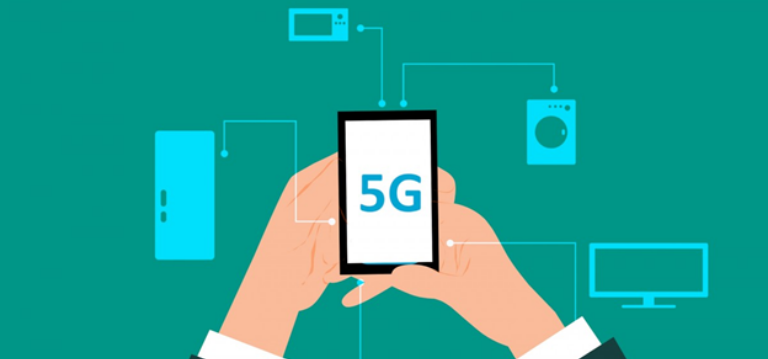5G technology has the potential to radically change the way we communicate with one another and with the increasingly Interconnected environment around us.
5G, is a name that is commonly used to describe the 5th generation of wireless mobile technologies and has been the topic of various discussions over the past few months. This technology, coupled with the advances we have made in Artificial Intelligence as well as Cloud Computing and Communication, marks a major turning point in our society as we begin to move forward into the uncharted waters that we commonly refer to as the 4th industrial revolution. And so, as society moves on and embraces its new digital future, it is important that we take a closer look at this technology and understand what 5G is as well as the impact that it will have on our ever-changing communication landscape and our everyday lives.
5G refers to a new generation of wireless mobile technology that is set to succeed 4G LTE, 3G, 2G, and WiMax. It is designed to be the main network that will facilitate the Internet of Things (IoT) which is a digital environment that comprises of an array of seamlessly interconnected devices and includes everything from the phone in your hand, to your car, printers and even other smart devices such as fridges, microwaves and your everyday run-of-the-mill street lights. 5G networks will allow smart machines like the ones mentioned above to connect to each other in ways that they never could before. This increased level of connectivity coupled with continuously improving cloud technology and advanced Artificial Intelligence (AI) allows these devices to constantly share large amounts of data while interacting with each other and the dynamic environments around them.
Have you ever wondered how self-driving cars work, or how they are able to adapt and interact with the constantly changing environment around them in real time and with relatively few errors? They do this by making use of ultra-high bandwidth, low latency networks such as 5G coupled with cloud communication and computing technologies that allow them to transfer and process relatively large amounts of data in short periods of time.
.png?width=577&name=pasted%20image%200%20(1).png)
“So, what does this mean for me?” you might ask.
The applications of 5G technologies seem to be limitless and even though the technology is still in its embryonic state in South Africa and will continue to be for some time to come, it will change the very essence of the way we do things on both consumer and enterprise levels. By merging 5G’s capability to produce insanely high speed, high bandwidth and low latency connections, while also being able to connect an even larger number of devices together seamlessly. 5G tech will directly contribute to great improvements not just in the communications landscape, but in gaming, medicine and in society as a whole.
Below are some benefits that you can expect when 5G is fully implemented:
- Virtual Presence: 5G technology combined with ‘always on’ cloud communication solutions will allow organisations to have permanent virtual presence and make sure that their services are available even in off- peak times. For example, chatbots can be used to interact with customers in situations when there are no staff members present to handle customer-facing roles. New high quality video conferencing software will also allow organisations to provide users with technical support wherever they may be on earth.
- Mobile Broadband: 5G technology will drastically improve the levels of bandwidth that we can reach. Users of these networks will be able to experience high speed data transfer rates and relatively low latency that will greatly change the way in which individuals consume data.
5G technology will allow us to transfer and download data at nearly 15 times the speed of its predecessor 4G, which means we will be able to download full HD videos in a matter of minutes and stream countless amounts of music with relatively minimal delays.
This increased rate at which we will be able to transfer data will greatly change the ways in which we communicate. Remote working will become easier as video conferencing technologies will be able to achieve much higher video quality levels while also being able to provide stable high-quality connections and increasing the number of devices that can be connected to each other for instantaneous and seamless communication and data sharing across platforms.
- Internet of Things: 5G technology is going to play a vital role in connecting different devices to form an environment of interconnected networks. These networks will enable all types of machines to communicate with each other as well as with you and the environment around them, which would give rise to new functionalities that allow users to experience convenient and highly customisable technological experiences.
The popularity of smart homes and devices will rise which will allow people to live in and create their own responsive and highly customisable technological bubbles. This will change the way we communicate with and interact with the environment around us.
- Increased large scale machine communication: 5G network technology will allow for a massive number of devices to connect to each other, and include technology such a sensor networks, connected homes (smart homes), smart metering and so on.
Everything will be trackable and customisable, from being able to remotely turn your lights on and off at home to knowing exactly where your children are through the aid of geo tracking in their smart watches. These new technologies will fundamentally change the way that we use and consume data and technology.
- Complex tasks: Improvements in cloud communication, computing and artificial intelligence will allow new model computers to carry out highly complex tasks, such as driving fleets of inter-connected vehicles and interacting with humans in ways that feels like we are actually talking to a real human being. This new technology will also facilitate industrial automation and the creation of smart factories, and will have many applications in the health field with new tech that allows for remote surgery.
The Impact of 5G on the cloud communication landscape
5G networks are set to fundamentally change the way in which our communications landscape is set up. This new-age network will require many communications companies and network providers to improve their infrastructure in order to accommodate the surge of data that will accompany this new environment of interconnected devices.
One of 5G’s main goals is to blur the line that currently separates wired line and wireless networks and transform the communications landscape at every level. By moving computing as close as possible to the end user through techniques such as edge-hosting and improved data centers such as the ones that were recently launched by Microsoft in Joburg and Cape Town, 5G networks will greatly reduce the bandwidth and latency that we experience across all mobile networks.
This means that we will be able to achieve high quality, high speed connections once 5G is implemented properly and the correct infrastructure is set up. 5G additionally allows us to unlock new techniques and ways of communication that seemed to be impossible just a few years ago - from virtual reality to 3D communication. This technology which will contribute to radically changing our communications landscape, additionally an increasing number of new devices that enter the market come with cloud connectivity built into them by default, further adding to this new interconnected environment that we live in.
This increase in cloud connectivity is creating an environment where we are evolving and moving away from on-premise data center approaches and leaning towards rapidly deployable and highly scalable intelligent cloud systems that will be able to reach even the most remote of areas. These combinations of 5G networks and cloud communication technologies will allow our mobile networks to become even more efficient than the ones that we are currently using. Higher speeds, higher bandwidth and reduced latency will allow us to experience ultra-high-quality video and voice call quality while also getting rid of those pesky buffer times.
Our reality
As exciting as 5G technologies may be, we have to ask ourselves the real questions, namely, “Is the infrastructure that we have here in South Africa ready to facilitate 5G connectivity?” Unlike areas such as America and Asia where 5G technology has already begun to take shape, we are still in our infancy as compared to the rest of the world and it will take some time for our infrastructure to develop and be fully able to implement wide scale 5G applications.
However, as with everything, it is not all gloom and doom and we will slowly catch up as the technology proliferates through the market and becomes cheaper and more accessible.
We are heading towards some exciting times and I honestly can't wait to see what new technology and ways of communication will arise once 5G technology matures and we are able to use it to its full capabilities. How will we communicate with each other and the environment and devices around us in the next 10 years, and what does the 4th industrial revolution have in store for us? Only time will tell.
Sign up to our weekly or monthly blog notifications to get regular updates on the world of communications from our experts.




